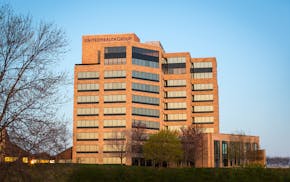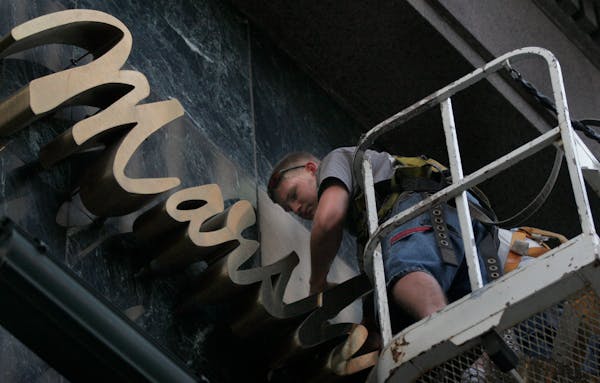As Macy's was being hailed at the Minneapolis Hilton Wednesday by downtown boosters for its many contributions to the city, blocks away the company was telling a stunned staff that it would close its Minneapolis division headquarters, laying off 950 employees.
The Cincinnati-based retailer, hurt by slowing sales in recent months, Wednesday announced a $150 million consolidation that would eliminate 2,300 jobs nationwide, including folding the Minneapolis-based Macy's North headquarters on Nicollet Mall into New York-based Macy's East. Although no stores are expected to close, the cuts are some of the biggest to hit the region in recent years, comparable to closing of the Ford plant in St. Paul.
The jobs are disappearing at a time the state has had the worst six-month stretch of job loss since the recession of 2001.
And the longer-term effect of losing the department store division, which has roots in downtown Minneapolis stretching back more than 100 years, remains to be seen. Macy's and its predecessor companies were some of the city's biggest boosters and civic supporters.
In an interview Wednesday, Macy's CEO Terry Lundgren said he would leave to new regional managers decisions about whether to maintain traditions.
Such traditions include the spring flower show and sponsoring of the Holidazzle parade, as Macy's did last year. Beginning in spring, Macy's plans to hire about 40 district and regional positions locally, part of about 250 such jobs around the country that are designed to better tailor its products to specific regions.
"They'll be in the best position to tell us what are the best places to donate, because these are the places where our customers and employees are attached to," Lundgren said. "We think community events are extremely important; we think that donating and giving back to community is extremely important. All of that will continue."
But many retail observers were skeptical. Without a regional division in Minneapolis, the Twin Cities market will have less significance to Macy's senior management, some analysts said. And the downtown Minneapolis store would be seen as little different from the rest, some argued.
Some civic boosters were dismayed by news that Macy's North Chairman Frank Guzzetta would retire in the spring. Guzzetta, 62, has aggressively promoted the downtown Macy's store, and was widely credited with persuading Macy's management to undertake a $15 million renovation of the store two years ago.
Guzzetta also has a close relationship with Minneapolis mayor R.T. Rybak, and the two worked together to recruit other retailers downtown.
On Wednesday, Rybak said he had a 30-minute conversation with Guzzetta, in which the Macy's executive assured him that the downtown store was "very strong" and would continue its special events. The annual holiday auditorium display at the Nicollet Mall store is said to cost more than $1 million and attracts a half-million visitors between Thanksgiving Day and New Year's Eve.
Guzzetta did not return calls Wednesday from the Star Tribune.
"This community has been very loyal to Macy's, but the jury is out on whether Macy's can keep that loyalty," Rybak said. "That loyalty will depend on how loyal Macy's is to the community."
Gwen Pappas, spokeswoman for the Minnesota Orchestra, which holds a Macy's Day of Music each summer that attracts some 20,000 people, said Macy's called Wednesday "to assure us that we would have continued support from Macy's in 2008."
Some downtown businesses also were worried about the loss of Guzzetta. Said Scott Kuhlman, owner of the Kuhlman Co. clothing stores: "I don't know who'll step into his shoes. As leader of that massive space downtown, he had a lot of clout."
Although rumors that Macy's might close its Minneapolis division had surfaced before, Wednesday's announcement seemed to take nearly everyone by surprise. Employees got about an hour's notice to gather in the eighth-floor auditorium at the Macy's store on Nicollet Mall, home of the annual winter holiday and spring flower shows. Macy's vice chairman Tom Cole got right to the point.
"We have news. It's not good for Macy's North," employees recalled him saying. He then read a company press release. He took no questions.
Meanwhile, a very different scene was unfolding several blocks away at the Minneapolis Hilton, where the Minneapolis Downtown Council, which promotes downtown businesses, was holding its annual meeting, and apparently no one was aware of Macy's announcement. A small cheer erupted in the ballroom when images of the Macy's Holidazzle parade flashed on the big screens behind the stage.
"Macy's was a one-company entertainment bonanza last year," declared Sam Grabarski, president and CEO of the council.
Yet at the center of the ballroom, a table reserved for Macy's executives was conspicuously empty. Plates of bib lettuce salad and chocolate raspberry cake lay untouched next to a "Macy's North" sign.
Grabarski said later he was "optimistic" that many of the displaced workers would find new jobs downtown. He noted that the 15 largest employers downtown hired 1,800 more people last year, an increase of 4 percent over the previous year.
State economist Tom Stinson was more pessimistic. Economically, the closing will take a toll at least as big as the initial round of layoffs at the Ford plant, he said.
"This is really sad news for the Minnesota economy, but it's even worse for the people who are affected," he said. "There's never a good time to lose your job, but this is a weakening economy and these people are being laid off in a very difficult time."
Tyler Rosengren, 26, an advertising account executive from Minneapolis who frequently buys lunches at the downtown Macy's, said the loss of the headquarters represented "the final stage of a downward spiral away from the Dayton's days."
"It's been a long time since this store felt special," he said.
cserres@startribune.com • 612-673-4308 jcrosby@startribune.com • 612-673-4206 hcummins@startribune.com • 612-673-4671

Justice Department sues to block UnitedHealth's $3.3 billion deal to acquire Amedisys

Apple headphones can work as hearing aids. Minnesota-based Starkey says it welcomes competition.

Bremer Bank reportedly for sale, months after settling long dispute with Otto Bremer Trust

